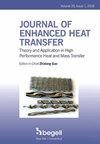Experimental Investigation on Behavior of a Diesel Engine with Energy, Exergy, and Sustainability Analysis Using Titanium Oxide (Tio2) Blended Diesel and Biodiesel
IF 1.5
4区 工程技术
Q3 ENGINEERING, MECHANICAL
引用次数: 0
Abstract
The performance and emissions characteristics of a diesel engine running on several fuel combinations, including diesel, biodiesel, and fuel mixed with TiO2 nanoparticles, are assessed in this research on a diesel engine. The study investigates how performance and emissions are impacted when diesel and biodiesel are treated with 50 and 100 ppm of TiO2 nanoparticles under varied engine loads ranging from 25 to 100%. The BTE values for the mixed biodiesel fuels with TiO2 nanoparticles (B0Ti50, B0Ti100, B5Ti50, and B5Ti100) show an improvement over normal diesel (B0) and biodiesel (B5) fuels. The addition of TiO2 nanoparticles leads to reductions in brake specific fuel consumption (BSFC) of up to 8% with B0 and up to 14.29% with B5, and improvements in brake thermal efficiency (BTE) of up to 2% with B0 and up to 4.02% with B5. With regard to carbon dioxide (CO2) and hydrocarbon (HC) emissions, the use of TiO2 nanoparticles decreased emissions by up to 18.4% at the cost of nitric oxide (NO) emissions, which increased by up to 5.87%. The exergy performance coefficient (Exp) and sustainability index (SI) increased by up to 18.99% and 5.63%, respectively. The percentage changes showed enhanced engine performance, lower emissions, and improved energy conversion efficiency with the inclusion of nanoparticles. The results suggest fuel blends' advantages in terms of energy and the environment; however, it is also important to look at the economic feasibility and stability of TiO2 nanoparticles.使用氧化钛(Tio2)混合柴油和生物柴油的柴油发动机行为实验研究及能量、放能和可持续性分析
本研究以柴油发动机为研究对象,评估了使用多种燃料组合(包括柴油、生物柴油和掺有纳米二氧化钛颗粒的燃料)的柴油发动机的性能和排放特性。研究调查了在 25% 到 100% 的不同发动机负荷下,用 50 和 100 ppm 的 TiO2 纳米粒子处理柴油和生物柴油时,对性能和排放的影响。与普通柴油(B0)和生物柴油(B5)相比,添加了二氧化钛纳米颗粒的混合生物柴油燃料(B0Ti50、B0Ti100、B5Ti50 和 B5Ti100)的 BTE 值有所改善。添加二氧化钛纳米粒子后,B0 的制动比油耗 (BSFC) 降低了 8%,B5 降低了 14.29%,B0 的制动热效率 (BTE) 提高了 2%,B5 提高了 4.02%。在二氧化碳(CO2)和碳氢化合物(HC)排放方面,使用 TiO2 纳米粒子最多可减少 18.4% 的排放,但一氧化氮(NO)排放却增加了 5.87%。能效系数(Exp)和可持续性指数(SI)分别增加了 18.99% 和 5.63%。这些百分比变化表明,加入纳米颗粒后,发动机性能增强,排放降低,能量转换效率提高。这些结果表明,混合燃料在能源和环境方面具有优势;然而,研究 TiO2 纳米粒子的经济可行性和稳定性也很重要。
本文章由计算机程序翻译,如有差异,请以英文原文为准。
求助全文
约1分钟内获得全文
求助全文
来源期刊

Journal of Enhanced Heat Transfer
工程技术-工程:机械
CiteScore
3.60
自引率
8.70%
发文量
51
审稿时长
12 months
期刊介绍:
The Journal of Enhanced Heat Transfer will consider a wide range of scholarly papers related to the subject of "enhanced heat and mass transfer" in natural and forced convection of liquids and gases, boiling, condensation, radiative heat transfer.
Areas of interest include:
■Specially configured surface geometries, electric or magnetic fields, and fluid additives - all aimed at enhancing heat transfer rates. Papers may include theoretical modeling, experimental techniques, experimental data, and/or application of enhanced heat transfer technology.
■The general topic of "high performance" heat transfer concepts or systems is also encouraged.
 求助内容:
求助内容: 应助结果提醒方式:
应助结果提醒方式:


